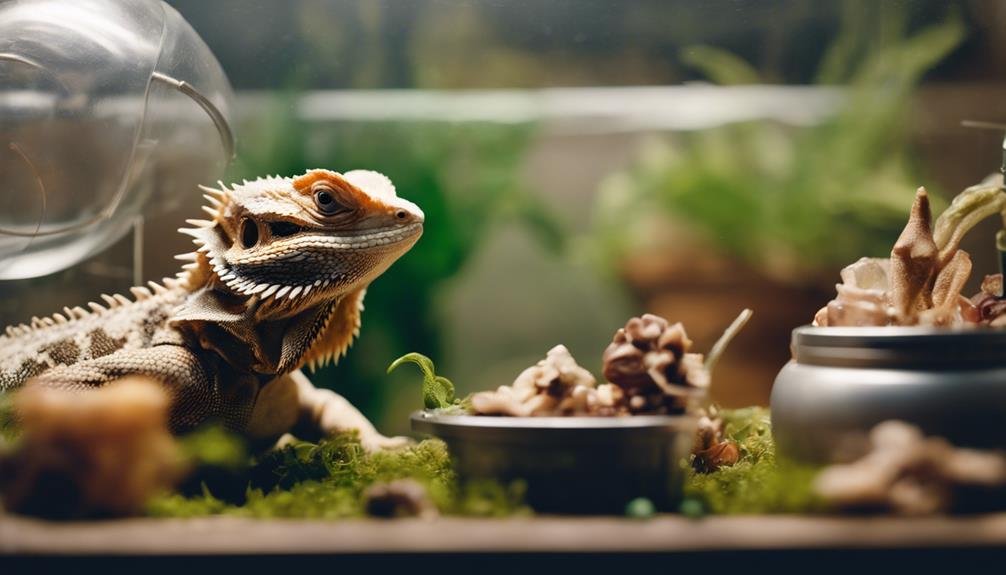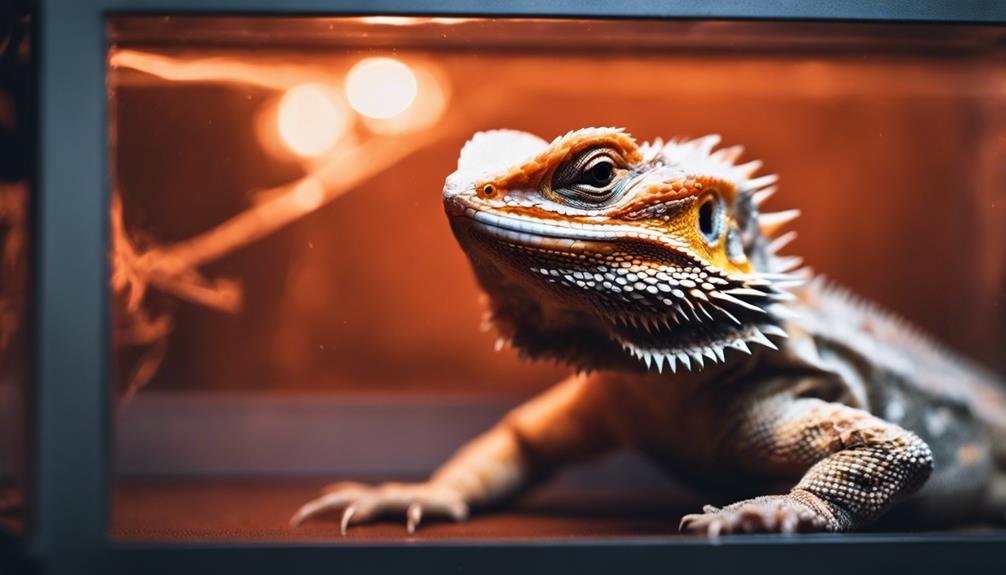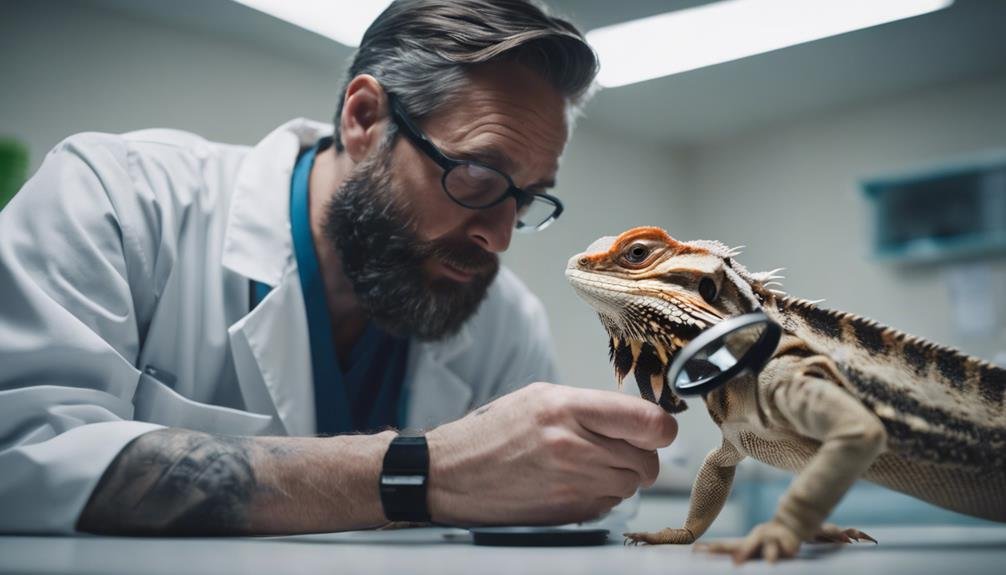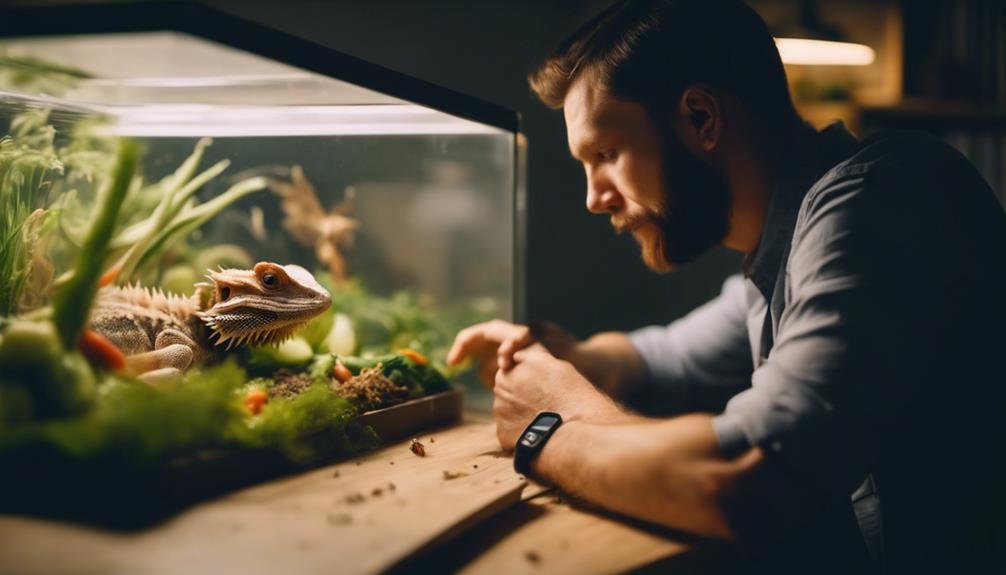If your bearded dragon's turning black and showing no interest in food, you're likely facing a worrying situation that merits immediate attention. This change in color and appetite can signal anything from stress, illness, to improper habitat conditions. Before you start panicking, it's important to take a step back and methodically assess your pet's environment, diet, and behavior for any red flags. You might be wondering where to begin or what could possibly be the root cause of such distressing symptoms. Let's explore some critical steps you should take to address these issues, ensuring your scaly friend returns to their healthy, vibrant self.
Key Takeaways
- Check for stress factors like environment changes or loud noises, and address them to reduce stress.
- Observe for signs of health issues and consult a reptile veterinarian for a thorough examination.
- Ensure the habitat has proper temperature gradients and UVB lighting for health and stress reduction.
- Review the diet for nutritional adequacy and consider dietary adjustments with veterinary advice.
- Provide hiding spots and minimize handling to create a secure and comfortable environment.
Understanding Color Changes
Bearded dragons often change color, and understanding these shifts can clue you into their health and mood. When your bearded dragon turns black, it's not just a random occurrence; it's a sign you shouldn't overlook. Black coloration in bearded dragons can signal stress, fear, or even be part of their dominance displays. But it's not all about emotions; health issues might also cause this shift. Additionally, these reptiles use darkening of their skin as a means of thermoregulation, absorbing heat more efficiently when they need to warm up.
Environmental factors, particularly temperature gradients within their habitat, play a significant role in this color change. If the temperature isn't just right, your bearded dragon might adjust its body color to better adapt to its surroundings. This ability to modify skin coloration in response to environmental conditions is fascinating, yet it's an important aspect you need to monitor.
Identifying Stress Factors
Understanding why your bearded dragon turns black can indicate their comfort level, but it's equally important to identify what's causing their stress. Recent environment changes, like a new location or shifts in temperature, can greatly impact your bearded dragon's stress levels. It's essential to observe any potential stress factors closely.
Loud noises, frequent handling, or the presence of other pets might be overwhelming them. Their habitat should be a safe haven, so make sure their tank is equipped with ample hiding spots and climbing accessories to offer security and stimulation. These elements can help reduce stress by providing a sense of control and safety within their environment.
Also, consider the dynamics within your household. Interactions with other pets or family members can inadvertently cause stress to your bearded dragon. Maintaining a consistent daily routine is key in reducing their stress levels. Avoid sudden changes in their schedule, as consistency in their day-to-day activities helps foster a sense of normalcy and security.
Recognizing Illness Signs


As you navigate the care for your bearded dragon, recognizing signs of illness is essential. Pay attention to behavioral changes like lethargy or loss of appetite, and don't overlook physical symptoms such as a swollen belly or difficulty breathing.
These indicators can help you catch health issues early and seek the necessary veterinary care.
Identifying Common Illness Signs
Recognizing signs of illness in bearded dragons, such as lethargy and appetite changes, is vital for their health and well-being. When your bearded dragon shows reduced activity or a sudden lack of interest in food, it's a clear signal something might be off.
- Lethargy and reduced activity: A once lively dragon spending more time sleeping.
- Changes in appetite: Refusing meals or eating much less than usual.
- Black beard or color changes: An unusual darkening that may signal stress or illness.
- Egg-laying problems in females: Signs of distress or difficulty could indicate serious health issues.
If you notice any of these symptoms, it's important to seek veterinary attention from a reptile vet immediately. Early intervention can make a significant difference in your bearded dragon's recovery.
Behavioral Changes to Monitor
Keep an eye on your bearded dragon's behavior; changes like lethargy or a sudden drop in appetite could signal an underlying health issue. It's distressing to see your pet suffer, and recognizing these signs early can make a significant difference.
| Behavioral Change | Possible Cause | Action Needed |
|---|---|---|
| Lethargy | Illness | Seek veterinary attention |
| Reduced Activity | Health concerns | Consult a vet |
| Changes in Appetite | Underlying issues | Veterinary check-up |
| Swollen Belly | Egg-laying problems in female dragons | Immediate vet visit |
| Discharge or Difficulty Breathing | Serious health issues | Prompt veterinary care |
These symptoms, especially in females facing egg-laying problems, demand swift action. Don't wait; health concerns in bearded dragons, like turning black and refusing to eat, are alarming and necessitate immediate veterinary attention to safeguard your beloved pet's well-being.
Physical Symptoms Overview
Identifying physical signs of illness in your bearded dragon, such as a black beard, lethargy, and loss of appetite, is essential for their health and well-being. When you notice these symptoms, it's a red flag that your pet might be experiencing stress, illness, or environmental issues requiring immediate action.
- Black Beard: Indicates stress, potential illness, or environmental discomfort.
- Lethargy and Loss of Appetite: Common signs your bearded dragon isn't feeling well.
- Swollen Belly: Could signal serious health issues, including egg-laying problems in females.
- Immediate Veterinary Attention: Vital for any bearded dragon exhibiting these physical symptoms to rule out severe health concerns.
Don't overlook these signs, as they're key indicators that something's off with your pet's health.
Checking Environmental Conditions


To ensure your bearded dragon's health, it's essential to examine the environmental conditions of their habitat, with a focus on temperature and lighting. If your bearded dragon is turning black and not eating, improper environmental conditions could be a contributing factor. The warm side of the cage should be maintained between 93-96°F, while the cool side should remain between 73-79°F. This temperature gradient allows your bearded dragon to regulate its body temperature by moving between warmer and cooler areas.
The basking area is particularly important and should be kept at a temperature of 105-115°F for adult beardies. A basking light is essential for providing this warmth, and you may need to adjust its wattage to achieve the right temperature. Additionally, ensuring your bearded dragon receives 12-14 hours of UVB light daily is crucial for their health. This light helps them synthesize vitamin D3, which is necessary for calcium absorption. Remember to replace UVB bulbs every 6 months to maintain their effectiveness.
Proper temperature management and adequate lighting aren't just recommended; they're essential for the health and well-being of your bearded dragon. Ignoring these environmental conditions can lead to health issues, including the concerning signs of turning black and not eating.
Evaluating Diet and Nutrition
Now, let's look at your bearded dragon's diet and nutrition to make sure they're getting what they need.
You'll want to assess their nutritional needs, recognize common dietary mistakes, and identify the best food choices to keep them healthy.
It's important to adjust their diet accordingly, especially if they're showing signs of distress like turning black and not eating.
Assessing Nutritional Needs
Often, the foundation of your beardie's health issues can be traced back to its diet, making it essential to evaluate the balance and variety of vegetables, insects, and supplements it consumes. Here's what to keep in mind:
- Vegetables: Maintain a variety and freshness to meet your bearded dragon's nutritional requirements.
- Insects: Include appropriate insects like crickets, dubia roaches, or phoenix worms, which are important for their diet.
- Supplements: Calcium and vitamin supplementation are essential to prevent metabolic bone disease.
- Reptile Vet Consultation: Seek guidance from a reptile vet for specific dietary adjustments based on your beardie's health condition.
Addressing these dietary elements can have a significant impact on the health and well-being of your bearded dragon, helping to avoid nutrition-related issues.
Common Dietary Mistakes
When evaluating your bearded dragon's diet, it is important to spot and correct common dietary mistakes that can compromise its health.
| Diet Component | Correct Ratio | Common Mistakes |
|---|---|---|
| Vegetables | 70-80% (Adults) | Insufficient variety |
| Insects | 30% (Young) | Over-reliance |
| Dark Leafy Greens | As part of veg | Lacking diversity |
| Calcium & Vitamins | Supplemented | Inadequate amounts |
| Substrate | Non-ingestible | Sand ingestion risk |
Ensuring a balanced diet between vegetables and insects, tailored to the age of your bearded dragon, is important. Include dark leafy greens for diversity, and supplement with calcium and vitamins for health. Avoid dietary mistakes like substrate ingestion by using safe alternatives to prevent sand or gravel from compromising your bearded dragon's diet balance and overall well-being.
Optimal Food Choices
Evaluating your bearded dragon's diet for ideal nutrition requires a careful balance of vegetables and insects, tailored to their age and health needs. To guarantee your bearded dragon receives all the necessary nutrients for a vibrant, healthy life, consider these best food choices:
- Dark leafy greens: Incorporate kale, mustard greens, and collard greens for dietary variety.
- Calcium and vitamin supplementation: Essential for preventing nutritional deficiencies.
- Appropriate insect offerings: Younger dragons need more insects, like crickets and mealworms, compared to adults.
- Regular feeding routines: Adjust based on age, with careful monitoring of their nutritional intake.
Monitoring Mating Behaviors
To guarantee your bearded dragons' health and happiness during breeding season, it's important to closely monitor their mating behaviors. Understanding these behaviors, including head bobbing, arm waving, and tail curling, is vital. When you notice your male dragon darkening his beard, it's not just a unique trait but a dominant behavior intended to impress females. Similarly, females might lift their hindquarters as a sign of receptivity towards a male.
These mating rituals aren't only intriguing but also telltale signs of your pets' well-being. However, when your bearded dragon is turning black and not eating, it's an indication that something might be off. Mating behaviors can greatly be influenced by environmental factors such as temperature and lighting. Ensuring that these are at ideal levels is key to maintaining the well-being of your bearded dragons, especially during the breeding season.
Monitoring these behaviors and environmental conditions helps you understand if the changes you're observing are part of normal mating processes or if there are underlying issues affecting your pet's health. Keep a vigilant eye on these signs to make sure your bearded dragons remain healthy and content throughout the breeding season.
Consulting With a Veterinarian


Understanding your bearded dragon's mating behaviors and guaranteeing their environment is ideal are important steps, but if your pet's black coloration and lack of appetite continue, it's time to consult with a reptile veterinarian. This professional can offer a proper diagnosis and suggest the best course of treatment for your bearded dragon, addressing the root cause of their symptoms.
When you're worried about your bearded dragon's health, remember these critical steps for veterinary intervention:
- Consult a reptile veterinarian who's experienced with bearded dragons to guarantee accurate diagnosis and effective treatment.
- Undergo necessary tests, such as blood work, X-rays, and ultrasounds, to identify any underlying health issues causing the black coloration and loss of appetite.
- Seek tailored advice on improving husbandry conditions and making dietary adjustments that cater specifically to your bearded dragon's needs.
- Promptly address potential health concerns with veterinary intervention to ensure the well-being of your beloved pet.
Implementing Preventative Measures
Preventing your bearded dragon from experiencing stress-induced color changes and appetite loss starts with making sure their enclosure has the proper temperature gradients. It's important to create a comfortable environment that mimics their natural habitat. This means setting up the enclosure with adequate hiding spots and climbing accessories to reduce their anxiety and fear. These elements offer your bearded dragon the privacy and exercise it needs to stay healthy and stress-free.
Maintaining a consistent lighting schedule with appropriate UVB exposure is also essential for their overall health and well-being. UVB light is important for vitamin D3 synthesis, which aids in calcium absorption, preventing metabolic bone disease. Pay attention to environmental factors like humidity levels, as well, to ensure the habitat is as comfortable as possible for your pet.
Lastly, offering a varied and balanced diet is key to supporting your bearded dragon's nutritional needs. A proper diet prevents potential health issues and ensures your bearded dragon remains active and healthy. By focusing on these preventative measures, you can minimize the chances of your bearded dragon turning black due to stress and keep them from losing their appetite.
How Can I Tell if My Bearded Dragon is Sick and What Should I Do About it?
If your bearded dragon is showing signs of illness such as a lack of appetite, lethargy, or abnormal behavior, it’s crucial to take action immediately. Consult with a reptile veterinarian to determine the best course of treatment and to ensure a proper send off for bearded dragons that may be suffering from illness.
Frequently Asked Questions
What to Do if Your Bearded Dragon Turns Black?
If your bearded dragon turns black, start by checking its temperature and observing its behavior closely. Look for stress factors and make environmental adjustments accordingly.
Assess its health, hydration levels, and lighting conditions. Consider if it's shedding or having issues with companions. Analyze its nutrition to make sure it's not lacking.
These steps can help identify the cause, but if problems persist, it's best to consult a vet for a thorough examination.
What to Do if Your Bearded Dragon Is Not Eating?
If your bearded dragon's not eating, first, check the enclosure's temperature and adjust the light cycle to stimulate their appetite. Offer a diet variety, including live insects and fresh veggies, and try different feeding techniques, like hand-feeding.
Make sure they're hydrated, using methods like misting. Consider environmental enrichment and stress reduction strategies. Supplements and appetite stimulants can help, but if these don't work, it's important to screen for parasites and consult a vet for advice.
How Do You Save a Sick Bearded Dragon?
To safeguard a sick bearded dragon, you'll need to guarantee proper temperature regulation and UVB lighting in their habitat. Boost their hydration with regular baths, reduce stress, and keep their living space clean.
Don't forget to visit the vet for a thorough check-up, including a parasite check. Following the vet's advice, provide nutritional supplements as needed.
How Do You Save a Starving Bearded Dragon?
To guarantee the recovery of a starving bearded dragon, you'll need to focus on hydration methods and warm baths first. Consider force-feeding tips with nutritional supplements and establish regular feeding schedules.
Use appetite stimulants carefully, and work on stress reduction through habitual changes. Always consult a vet for the best advice and possible referrals.
Keep a close eye on their recovery, adjusting care as needed to make sure they get back to health.
Conclusion
If your bearded dragon's turning black and isn't eating, it's important to act fast. Start by checking their environment for stressors and make sure it meets their needs. Look for signs of illness and consider their diet and nutrition.
Mating behaviors can also cause stress, so keep an eye out. Most importantly, consult a vet to get a professional opinion. Taking these steps can help your bearded dragon recover and prevent future issues.
Remember, their well-being depends on your care and attention.


